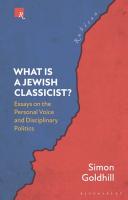
Bloomsbury Academic (2022) p/b 188pp £15.29 (ISBN 9781350322530)
In 2021, reports of anti-Jewish hate incidents in the West were the highest since data was first assembled after the Second World War. In Britain both Jeremy Corbyn’s Labour Party and the National Union of Students were accused of legitimizing attacks on Jews, irrespective of the degree of religious belief or cultural and political preferences. Antisemites typecast any Jew as a ‘Zio’ and used both words as terms of vilification and abuse. David Baddiel’s recently published book Jews Don’t Matter and Sir Keir Starmer’s determination to root out racism from his Party are pushing back against this bigotry. G.’s book What is a Jewish Classicist? offers a historian’s perspective on the same issue.
When G. took up his fellowship in Cambridge 50 years ago, a senior don enquired: ‘Goldhill. That’s a Jewish name … Where did you learn English?’ The insult festered in G.’s memory; at his school in north London, it was accepted that Jewish boys would be absent on the High Holydays. Recently—a point not noted in his book, but reported widely in the media—G. and his wife have hosted a Syrian Muslim refugee at their home, a mark of their generosity and cultural openness.
What is a Jewish Classicist? consists of three essays. The first, in six parts, considers how classical academics talk about themselves and how their Jewishness affects their perceptions. The second, giving the book its title, takes a socio-anthropological approach and examines Jewish responses to historical prejudices in academia. The third discusses the practice of literary translation and its impact on society. G. has summarized his arguments in an article in The Lehrhaus, which is accessible on the internet: https://thelehrhaus.com/commentary/what-is-a-jewish-classicist/
In the essays, G. tries to put hurt aside. He uses the Hebrew term ‘Shoah’ rather than ‘the Holocaust’. He is happier describing the responses of others rather than self-serving stories about his own experiences. The Harvard philosopher Stanley Cavell (1926-2018), he notes, was originally called Goldstein, but changed his surname during the war, to avoid announcing his Jewishness. G.’s object is to write about ‘the personal voice of scholarship, without a personal biography’. While he professes anger at the viciousness of the anti-Jewish texts of antiquity and their continuing impact on Christian worship, he is embarrassed to give a personal response as a Jew. Instead, he interviewed some forty people from ten countries and read obituaries, diaries and histories.
G.’s perspective is firmly that of an ancient historian. He describes John Chrysostom’s hate-filled 4th-century sermons. He complains that the Jewish Septuagint, the letters of St Paul and the works of Philo and Josephus, handed down to us in Greek, have not been given equal footing with other Greek literary works of antiquity. Choices of these last two as research topics for an academic career have, he argues, been ‘historically proven to be gestures of self-marginalization’.
G. records that many Jewish classical scholars, including Eduard Fraenkel and Moses Finley, did not engage publicly with their Jewishness. Finley kept the name Moses, but his family surname was originally Finkelstein. Sir Geoffrey Elton, a regius professor at Cambridge, arrived in England in 1939 as Gottfried Ehrenburg. Arnaldo Momigliano joined the Fascist Party in Italy but had to escape from Nazi Europe; as a professor at UCL, he re-engaged with Judaism.
G. draws on named socio-anthropological sources to shed light on the ‘positionality’ and ‘situatedness’ of the Jewish classicist. Widely read himself, he assumes that his readers are familiar with such commentators and their writings. A dictionary may be required to elucidate words like cathexis, deixis, proxemics and imbrications. A helpful editor could have contributed to greater clarity of expression. In describing some ‘salient vectors’, G. writes (or is misprinted as having written): ‘It is by now a familiar story that in the nineteenth century, from romantic Philhellenism through the role of classics in education and classicism in the arts, to the politics of imperialism, how modern Europe placed itself in a genealogy with the past of antiquity formed a crucial nexus of self-definition.’
G. identifies an ‘educational culture war’ arising from the tensions between reproducing social norms and changing social understanding. Classical studies, in England in particular, have in his view been narrow and elitist. Traditionally, clever boys in the English private school system were directed to Classics, where the epitome of achievement was to translate English (and even French) poetry into Latin and Greek verses. From this grounding a privileged class emerged, and the culture of Empire and government was formed. When privilege engendered feelings of permanent entitlement, social damage was unavoidable.
What is a Jewish Classicist? is a book for the specialist reader. It deals with a wide range of complex but inter-related topics, and it demands full engagement. It repays reading because of its illumination of Jewish responses to prejudice and challenge.
Stuart Lyons
